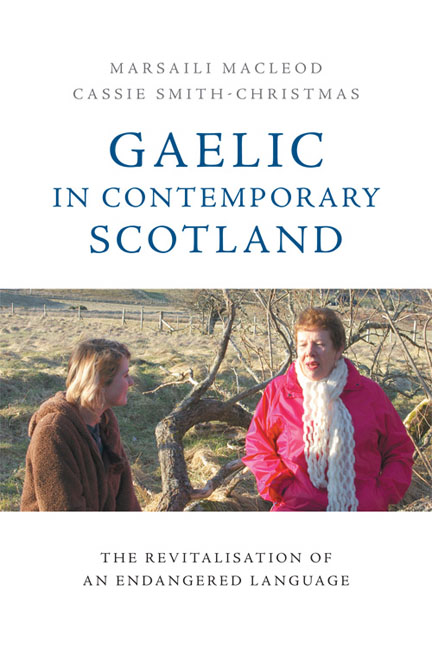Book contents
- Frontmatter
- Contents
- List of Figures
- List of Tables
- Notes on Contributors
- Foreword: Assailed yet Resolute
- Acknowledgements
- List of Abbreviations
- 1 Introduction
- 2 The Language of the Playground: Activists Building Consensus on the Language Policy and Ethos of a New Gaelic Immersion School
- 3 Mismatches between National and Local Gaelic Development: Cròileagan Dùn Èideann and the Promotion of Gaelic-medium Education
- 4 Gaelic amongst Schoolchildren: Ideas on Language Change and Linguistic Choices in Gaelic
- 5 When School is Over and Done With: Linguistic Practices and Sociodemographic Profiles of Gaelic-medium Educated Adults
- 6 New Speakers of Gaelic: A Historical and Policy Perspective
- 7 Learning Gaelic in Adulthood: Second Language Learning in Minority Language Contexts
- 8 Dlùth is Inneach: Charting Language Ideology in the Contemporary Gaelic World
- 9 Gaelic Language Use in Public Domains
- 10 Planning for Growth: The Professionalisation of the Taskforce for Gaelic Revitalisation
- 11 Organisational Language Planning: Gaelic Language Plans in the Public Sector
- 12 The Future of Gaelic Language Revitalisation in Scotland
- Index
6 - New Speakers of Gaelic: A Historical and Policy Perspective
Published online by Cambridge University Press: 18 December 2019
- Frontmatter
- Contents
- List of Figures
- List of Tables
- Notes on Contributors
- Foreword: Assailed yet Resolute
- Acknowledgements
- List of Abbreviations
- 1 Introduction
- 2 The Language of the Playground: Activists Building Consensus on the Language Policy and Ethos of a New Gaelic Immersion School
- 3 Mismatches between National and Local Gaelic Development: Cròileagan Dùn Èideann and the Promotion of Gaelic-medium Education
- 4 Gaelic amongst Schoolchildren: Ideas on Language Change and Linguistic Choices in Gaelic
- 5 When School is Over and Done With: Linguistic Practices and Sociodemographic Profiles of Gaelic-medium Educated Adults
- 6 New Speakers of Gaelic: A Historical and Policy Perspective
- 7 Learning Gaelic in Adulthood: Second Language Learning in Minority Language Contexts
- 8 Dlùth is Inneach: Charting Language Ideology in the Contemporary Gaelic World
- 9 Gaelic Language Use in Public Domains
- 10 Planning for Growth: The Professionalisation of the Taskforce for Gaelic Revitalisation
- 11 Organisational Language Planning: Gaelic Language Plans in the Public Sector
- 12 The Future of Gaelic Language Revitalisation in Scotland
- Index
Summary
In recent decades, and especially in the twenty-first century, ‘new speakers’ of Gaelic have become more numerous and prominent within the Gaelic-speaking community and the Gaelic professional world in Scotland (MacCaluim 2007a; McLeod et al. 2014). The national census does not distinguish between new and traditional, first language (L1) and second language (L2) Gaelic speakers, however, and there are no other authoritative data that show the number or proportion of new speakers within the overall Gaelic-speaking community. The term ‘new speaker’ has become increasingly widely used in contemporary sociolinguistics (O'Rourke et al. 2015); although operative definitions vary somewhat, the key factor is the absence of inter-generational, home-based language transmission. Some definitions are more exacting than others in terms of the degree of language ability and active use that is required for an individual to be properly classified as a ‘speaker’, or more accepting of lesser degrees of ‘newness’ in terms of the timeline of individuals’ learning trajectories (i.e. the age at which they began to acquire the language) and socio-cultural distance from the traditional speech community (Armstrong 2013; McLeod et al. 2014: 22). The term ‘new’ may also be misinterpreted so as to posit newness in a historical sense, i.e. to imply that such speakers did not exist at an earlier point in time, so that their emergence is to be understood as an unprecedented sociolinguistic phenomenon. In the Gaelic case, it is true that until recently (until the 1990s or indeed the 2000s) new speakers were relatively few. Yet on closer examination, new speakers can be seen to have made important contributions to Gaelic cultural and political initiatives since the middle of the nineteenth century, even if new speakers were rarely valorised and the importance of producing new speakers rarely prioritised by policy-makers or activists. This chapter will review the evolving role of new speakers since the late nineteenth century and analyse the principal sociolinguistic issues and policy chal-lenges that have come to the fore today.
Two interrelated factors acted to constrain the number of such new speakers in earlier decades. First, the limited provision for Gaelic that existed within Scotland's public school system from the 1870s onwards was aimed almost entirely at native speakers of the language.
- Type
- Chapter
- Information
- Gaelic in Contemporary ScotlandThe Revitalisation of an Endangered Language, pp. 79 - 93Publisher: Edinburgh University PressPrint publication year: 2018

